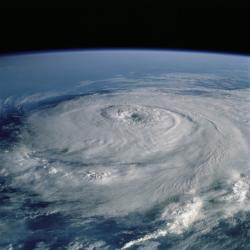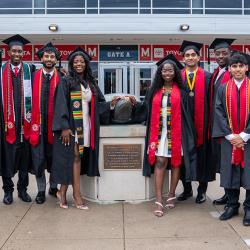Two Science Terps Awarded NOAA Hollings Scholarships
April 1, 2020 is a day Sam Varga won’t likely forget. Not because of an April Fools’ prank or because it was his birthday, but because of an email he discovered in his inbox first thing that morning. In it, four all-important words: “Congratulations, Hollings Scholarship recipient.”
 “I was still half asleep when I read it, and it was like I had to reread it five or six times,” Varga said. “It took a while to stop pinching myself to see if I was dreaming.”
“I was still half asleep when I read it, and it was like I had to reread it five or six times,” Varga said. “It took a while to stop pinching myself to see if I was dreaming.”
For Varga, a sophomore majoring in atmospheric and oceanic science at the University of Maryland, winning the 2020 National Oceanic and Atmospheric Administration (NOAA) Ernest F. Hollings Scholarship is the first step toward taking his study of atmospheric science to the next level. And he isn’t alone. Sophomore atmospheric and oceanic science major Ciara Donegan also received a 2020 Hollings Scholarship.
“When I applied for Hollings, that was my big dream, and now I’m here,” Varga said. “This is really the first opportunity I’m going to have to start making progress on figuring out what I want to do for a career.”
NOAA Hollings Scholars receive up to $19,000 over two years, as well as professional development opportunities including a 10-week paid summer internship at a NOAA facility. The internship provides scholars with hands-on educational training experience in NOAA-related research, technology, policy, management and education.
“I feel incredibly blessed and grateful that I got the scholarship because ultimately my career goal is to end up working for NOAA,” Varga explained. “So this is really a way for me to start identifying what types of work I might want to do with them and which branches of research I might want to go into.”
Varga said his interest in weather started as kind of a fluke. Freshman year in high school, he was homebound with an illness for several days and started watching the Weather Channel. Soon, he found himself memorizing what he saw, forecast by forecast. By the time he went back to school, he was hooked.
“At my core I’m a weather nerd, and I’m studying this because I think it’s cool and I love it,” he said.
Now, Varga writes weather reports of his own, as one of more than a dozen students who post regular forecasts online for UMD Weather. He has a special interest in tornados and severe weather. A favorite diversion when he’s not studying—weather photography.
“There’s one picture that I’m really proud of,” Varga said. “It’s a picture looking out over the campus toward the Iribe Center early in the morning, and you can see the sun coming up behind the clouds. On the horizon, there’s this really nice thunderstorm from the night before and you see this rained out shell of the cloud.”
Being able to look at the sky and appreciate its beauty is enough for most people, but Varga finds additional beauty in understanding the sky and the processes behind what he sees happening in the clouds.
For Varga and Donegan, the Hollings Scholarship program is designed to prepare them for public service careers with NOAA and other natural resource and science agencies at all levels of government and for careers as educators in oceanic and atmospheric science. From 2016 to 2019, 17 UMD students won Hollings Scholarships.
 Donegan, a Banneker/Key Scholar, discovered her passion for research early on at Maryland. Last year, she worked on a NASA project, digitizing satellite observations of aerosols from the Multi-angle Imaging SpectroRadiometer (MISR) instrument. The project was created five years ago by Ralph Kahn, senior research scientist at NASA’s Goddard Space Flight Center, as a way to get students involved in fundamental research. Two of UMD’s 2019 Hollings Scholars are also part of this team.
Donegan, a Banneker/Key Scholar, discovered her passion for research early on at Maryland. Last year, she worked on a NASA project, digitizing satellite observations of aerosols from the Multi-angle Imaging SpectroRadiometer (MISR) instrument. The project was created five years ago by Ralph Kahn, senior research scientist at NASA’s Goddard Space Flight Center, as a way to get students involved in fundamental research. Two of UMD’s 2019 Hollings Scholars are also part of this team.
This year, Donegan is working with Rachel Tilling at NASA Goddard and UMD atmospheric and oceanic science graduate student Stephen Fons, looking at data that the latter two gathered in Antarctica and analyzing the composition of the ice.
“While Arctic snow tends to be homogeneous in composition and its impact on satellite data is easy to account for, Antarctic sea ice tends to be more uneven and is difficult to account for. We’re essentially going to be looking at Antarctic radar data to hopefully work out how different kinds of snow affect satellite and radar returns,” Donegan explained. “It’s very cool. I hope to go to Antarctica someday.”
On a completely different note, Donegan is an active member of UMD’s Gamer Symphony Orchestra, a unique group dedicated to writing and performing video game music. As part of the orchestra, Donegan plays musical arrangements created by other student members, and this year, she submitted a composition of her own for the first time. It’s definitely a change of pace from her work in the lab.
“I really enjoy having a more creative outlet along with my major classes, which are more analytical,” Donegan said.
As she looks forward to all the Hollings Scholarship has to offer, Donegan sees her future coming into focus.
“I hope to be a research scientist. Possibly a climatologist. I have a real interest in climate science,” Donegan explained. “Right now, being able to do research is really exciting, and that’s what I’m looking forward to doing.”
###
Media Relations Contact: Leslie Miller, 301-405-9267, lmille12@umd.edu
University of Maryland
College of Computer, Mathematical, and Natural Sciences
2300 Symons Hall
College Park, MD 20742
www.cmns.umd.edu
@UMDscience
About the College of Computer, Mathematical, and Natural Sciences
The College of Computer, Mathematical, and Natural Sciences at the University of Maryland educates more than 9,000 future scientific leaders in its undergraduate and graduate programs each year. The college's 10 departments and more than a dozen interdisciplinary research centers foster scientific discovery with annual sponsored research funding exceeding $175 million.








